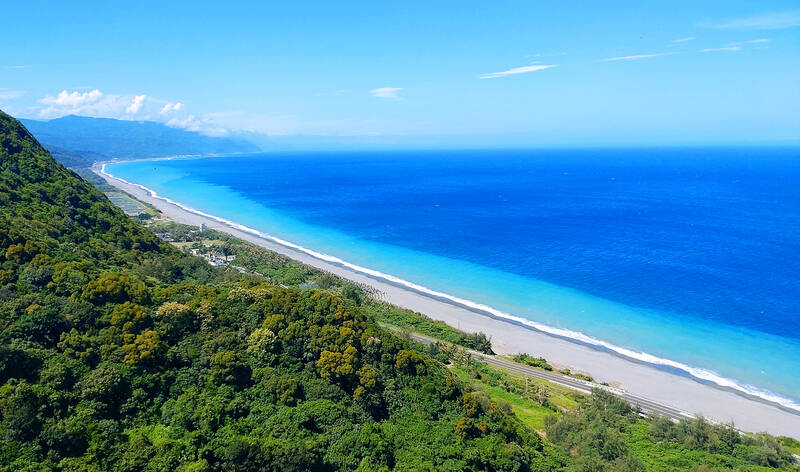Staff reporter, with staff writer
The legislature yesterday passed an amendment to the Marine Pollution Control Act (海洋污染防治法), including higher penalties for polluters and a special corporate tax that would help establish an ocean pollution prevention fund.
Under the amendment, people who release waste into the ocean or an adjoining natural reserve, geopark, national park, wildlife conservation area or significant wildlife habitat would face up to five years in prison, and possibly a combined fine of up to NT$100 million (US$3.25 million), up from the current maximum prison term of three years, commutable to a fine of NT$300,000 to NT$1.5 million.

Photo courtesy of a reader
Under the amendment, fines for engaging in unauthorized acts that potentially pollute the ocean, including discarding waste, transporting hazardous materials and constructing or operating unlicensed maritime facilities, would be up to NT$100 million, up from NT$300,000 to NT$50 million in the current version of the act.
Companies that are authorized to conduct such activities, including CPC Corp, Taiwan (台灣中油), Formosa Plastics Group (台塑集團) and the nation’s only harbor dredging operator, would pay a special tax, contributing to the “ocean pollution prevention and control fund,” the amendment says.
The fund would be used for pollution control technology research, and to pay for maritime pollution incident response and environmental damage compensation in cases for which the regular budget cannot be used, it says.
Under the amendment, maritime facilities must have a decommissioning plan, including an implementation schedule. Facilities that are not decommissioned as planned would be regarded as illegal maritime waste and removed, and their operator would be ordered to pay for the decommissioning.
Port authorities must regularly test water and sediment for toxicity, and prevent, remove or mitigate pollution at sites under their purview, the amendment says.
Under the amendment, ship inspection protocols would additionally focus on emergency plans for pollution incidents and vessels’ waste disposal logs.
Ships operated by foreign entities under foreign flags that are found to have contravened the act would be barred from leaving the harbor, and their owners and key crew members would be barred from leaving Taiwan until matters are resolved, the amendment says.
However, the curbs might be lifted for operators that promise to fulfill their obligations and post a deposit, it says.
Operators that fail to post a deposit would be fined NT$600,000 to NT$30 million, it says.
The amendment also includes a whistle-blower protocol to protect the identity of people who report ocean pollution incidents and provide rewards if their information help uncover significant incidents.

The CIA has a message for Chinese government officials worried about their place in Chinese President Xi Jinping’s (習近平) government: Come work with us. The agency released two Mandarin-language videos on social media on Thursday inviting disgruntled officials to contact the CIA. The recruitment videos posted on YouTube and X racked up more than 5 million views combined in their first day. The outreach comes as CIA Director John Ratcliffe has vowed to boost the agency’s use of intelligence from human sources and its focus on China, which has recently targeted US officials with its own espionage operations. The videos are “aimed at

STEADFAST FRIEND: The bills encourage increased Taiwan-US engagement and address China’s distortion of UN Resolution 2758 to isolate Taiwan internationally The Presidential Office yesterday thanked the US House of Representatives for unanimously passing two Taiwan-related bills highlighting its solid support for Taiwan’s democracy and global participation, and for deepening bilateral relations. One of the bills, the Taiwan Assurance Implementation Act, requires the US Department of State to periodically review its guidelines for engagement with Taiwan, and report to the US Congress on the guidelines and plans to lift self-imposed limitations on US-Taiwan engagement. The other bill is the Taiwan International Solidarity Act, which clarifies that UN Resolution 2758 does not address the issue of the representation of Taiwan or its people in

US Indo-Pacific Commander Admiral Samuel Paparo on Friday expressed concern over the rate at which China is diversifying its military exercises, the Financial Times (FT) reported on Saturday. “The rates of change on the depth and breadth of their exercises is the one non-linear effect that I’ve seen in the last year that wakes me up at night or keeps me up at night,” Paparo was quoted by FT as saying while attending the annual Sedona Forum at the McCain Institute in Arizona. Paparo also expressed concern over the speed with which China was expanding its military. While the US

SHIFT: Taiwan’s better-than-expected first-quarter GDP and signs of weakness in the US have driven global capital back to emerging markets, the central bank head said The central bank yesterday blamed market speculation for the steep rise in the local currency, and urged exporters and financial institutions to stay calm and stop panic sell-offs to avoid hurting their own profitability. The nation’s top monetary policymaker said that it would step in, if necessary, to maintain order and stability in the foreign exchange market. The remarks came as the NT dollar yesterday closed up NT$0.919 to NT$30.145 against the US dollar in Taipei trading, after rising as high as NT$29.59 in intraday trading. The local currency has surged 5.85 percent against the greenback over the past two sessions, central